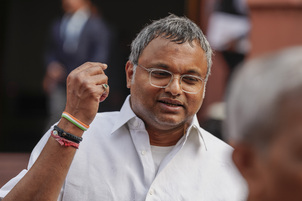New Delhi: Justice Surya Kant was on Thursday appointed as the 53rd Chief Justice of India and will assume charge on November 24.
The Department of Justice in the Union Law Ministry issued a notification announcing his appointment.
Justice Surya Kant succeeds Justice Bhushan R Gavai, who demits office on November 23.
President Droupadi Murmu has appointed Justice Surya Kant as the next Chief Justice of India (CJI) with effect from November 24, 2025.
“In exercise of the powers conferred by the Constitution of India, the President is pleased to appoint Shri Justice Surya Kant, Judge of the Supreme Court of India as the Chief Justice of India with effect from 24th November, 2025. I convey my heartiest congratulations and best wishes to him,” Law Minister Arjun Ram Meghwal tweeted on Thursday.
On October 27, the Chief Justice of India (CJI) BR Gavai had recommended the name of Justice Kant to the Centre as his successor. The CJI’s recommendation came after he received a letter from Meghwal who asked him to nominate his successor.
It is a convention that the sitting CJI recommends the seniormost judge after himself as the next CJI. The incumbent CJI Gavai will step down on November 23.
Justice Kant will be taking charge at a time when the judiciary is grappling with huge pendency of cases.
Elevated as a judge of the Supreme Court on May 24, 2019, Justice Kant will retire on February 9, 2027, after one year, three months and 15 days. He will also be the Chairman of the Supreme Court Legal Services Committee, with effect from November 12, 2025.
As per the Supreme Court website, the 63-year-old Justice Kant was born in Hisar in Haryana and graduated from the Government Post Graduate College there in 1981. He acquired his Bachelor’s degree in Law in 1984 from Maharishi Dayanand University, Rohtak. He started practicing law at the District Court, Hisar, in 1984, and shifted to Chandigarh in 1985 to practice in the Punjab and Haryana High Court. Specializing in Constitutional, service, and civil matters, he represented some universities, boards, corporations, banks and also the High Court itself.
He was appointed as Advocate General (AG) of Haryana on July 7, 2000, and was designated as Senior Advocate in March 2001. He held the office of Advocate General, Haryana, till his elevation as a permanent judge to the Punjab and Haryana High Court on January 9, 2004. Justice Kant was nominated as a member of the governing body of the National Legal Services Authority on February 23, 2007, for two consecutive terms till February 22, 2011.
He is presently a member of various committees of the Indian Law Institute, a deemed university under the aegis of the Supreme Court. He earned another distinction of standing first in his Master’s degree in Law in 2011 from the Directorate of Distance Education, Kurukshetra University.
He assumed charge as Chief Justice of the High Court of Himachal Pradesh with effect from October, 5, 2018.
Justice Kant has pronounced several landmark verdicts and orders. He was part of the bench that upheld the abrogation of Article 370 concerning Jammu and Kashmir and the bench that struck down the electoral bonds scheme, citing a violation of citizens’ right to information. Justice Kant also authored the majority opinion validating Section 6A of the Citizenship Act, part of the Assam accord.
He also upheld the validity of the One Rank One Pension (OROP) scheme for the armed forces. Justice Kant was part of the bench that appointed an expert panel in the Pegasus spyware case, stating the state cannot use national security as a free pass for surveillance.
He has been involved in cases concerning the appointment of the Delhi Police Commissioner and the protection of public water bodies, emphasizing they are public utilities and their takeover is illegal. During the COVID-19 pandemic, he was on a bench that directed authorities to consider releasing prisoners to alleviate overcrowding in jails.






